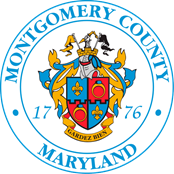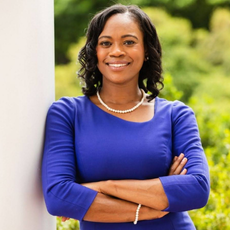S.M.A.R.T. Agenda
S.M.A.R.T. government is Laurie-Anne’s acronym for the policy agenda that will successfully position our County to compete in the economy of the future!
As a parent, lawmaker, organizer, and effective advocate, Laurie-Anne demonstrates her visionary leadership by focusing on the following key priorities:
- Strengthen 21st century learning from cradle to career and beyond
- Make a living in Montgomery County more affordable
- Advance sustainable local food production in the Ag Reserve
- Revitalize the economy while recovering from the pandemic
- Tackle climate change through multi-modal transportation infrastructure
Strengthen 21st Century Learning from Cradle to Career and Beyond
 As a former Paraeducator and the mother of an MCPS graduate, Laurie-Anne is keenly aware of the outstanding education that awaits our future leaders.
As a former Paraeducator and the mother of an MCPS graduate, Laurie-Anne is keenly aware of the outstanding education that awaits our future leaders.
Excellent schools were among the draws for her to call Montgomery County home. Having served as a board member and liaison respectively, of the Montgomery County Council of PTAs (MCCPTA) and the NAACP Parent Council at Luxmanor Elementary School, Tilden Middle School, and Gaithersburg High School, Laurie-Anne was on the front lines of some of the most challenging issues designed to reform local schools to ensure students graduate career and college-ready.
She’s witnessed the impact of public-private partnerships that strengthen MCPS students’ success. For example, her daughter completed a Certified Nursing Assistant (CNA) program her senior year in high school through a collaboration between the school system, a local neurologist, and a senior living community. This opportunity enabled students to graduate college and career-ready.
Schools and colleges within Montgomery County are strong because of the people who work there, the families, students, lifelong learners who attend them, and the funding that sustains them. But the pandemic’s effect has magnified a widening opportunity gap that disproportionately impacts low-income students and students of color. The pandemic also highlighted the importance of social-emotional learning and ensuring that every student interacting with our school system is destined for success.
To safely reconnect our students back into the classroom and sustain opportunities for lifelong learners to have holistic, comprehensive, and enjoyable educational experiences, Laurie-Anne is committed to:
- Closing the digital divide to safely reconnect our students to learning opportunities regardless of school boundaries.
- Prioritizing public-private partnerships to develop apprenticeship programs that will prepare students for in-demand careers of the future.
- Increasing salaries for experienced educators teaching our most challenged learners.
- Working with state and federal partners to increase funding for mental health services to evaluate the needs of people experiencing barriers to accessing care, poor mental health, substance abuse, learning loss, isolation, and job loss.
- Expanding access to broadband technology to improve access and engagement between educators, parents, students, and the community.
- Ensuring our seniors and lifelong learners have access to opportunities conducive to aging in place, including volunteering, socializing, and recreational activities.
Make a Living in Montgomery County More Affordable
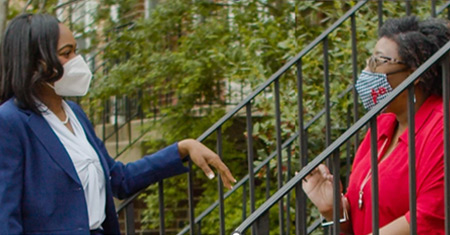 Laurie-Anne had two years remaining to complete her degree at the University of Maryland, College Park, when her daughter attended Rockville’s Luxmanor Elementary School. She worked as a Certified Pharmacy Technician, making just above minimum wage, but certainly not enough to afford market-rate housing when she saved up enough money to move out of her parents’ home.
Laurie-Anne had two years remaining to complete her degree at the University of Maryland, College Park, when her daughter attended Rockville’s Luxmanor Elementary School. She worked as a Certified Pharmacy Technician, making just above minimum wage, but certainly not enough to afford market-rate housing when she saved up enough money to move out of her parents’ home.
Luckily, Montgomery County’s Moderately Priced Housing Law (MPDU program), enacted in 1974 requiring all new developments in the county with 20 or more units to include a certain percentage of affordable units, enabled her to secure a safe and affordable starter home ---- allowing them to realize their greatest potential.
Laurie-Anne is committed to making Montgomery County an attractive and affordable place to call home by:
- Promoting housing policies like down payment assistance programs that center upward mobility by incentivizing homeownership pathways.
- Supporting residential projects that create more housing options and homes in our county, prioritizing housing near jobs and transit while helping us meet our regional goals for an additional 10,000 units by 2030.
- Fully funding the rental assistance program to help working families, developmentally disabled adults, and seniors avoid eviction and homelessness.
- Championing the other “Fight for 15%” to increase the set-aside floor for MPDUs to match the City of Gaithersburg’s affordable housing policy to ensure new residential projects provide more affordable housing units.
Advance Sustainable Local Food Production in the Ag Reserve
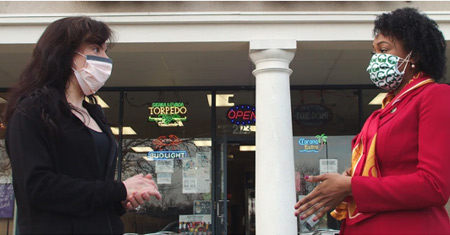 Laurie-Anne is proud to call Montgomery County home and where she chose to raise her family. While her story is not unique, Montgomery County can be the bridge to a fulfilling life if residents can access the multitude of opportunities afforded to anyone who desires to make this richly diverse community home.
Laurie-Anne is proud to call Montgomery County home and where she chose to raise her family. While her story is not unique, Montgomery County can be the bridge to a fulfilling life if residents can access the multitude of opportunities afforded to anyone who desires to make this richly diverse community home.
She feels that anyone willing to work hard should have a real opportunity and equal access to resources to create a better life for themselves and their family. One such underutilized opportunity is our County’s Agriculture Reserve. This gem generates over $280M in revenue for Montgomery County, ten times the amount of revenue generated by the County’s Alcohol Beverage Services.
As a Councilmember At-Large, Laurie-Anne plans to advance sustainable local food production in the Ag Reserve by:
- Reimagining local food production and the Ag Reserve’s role in feeding our County, thereby decreasing reliance on importing and exporting goods and reducing greenhouse gas emissions.
- Providing infrastructure to process and distribute food locally to enhance the affordability and accessibility of the farming industry countywide.
- Streamlining access to purchase affordable land, cultivate their crops, acquire food, and building permits for new and existing farmers to produce healthy food options.
- Leveraging this unique and sacred resource in our community to support and grow the “farm to food bank” program.
Revitalize the Economy while Recovering from the Pandemic
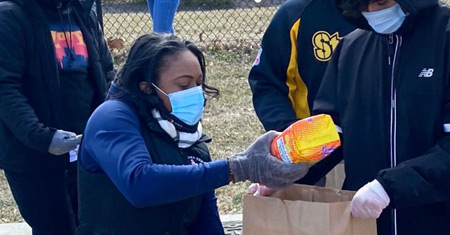 In spring 2020, Montgomery County joined jurisdictions across the state, nation, and the world to enforce safety restrictions and protocols to protect residents, workers, and visitors. As reopening and recovery guidelines are constantly changing in response to the pandemic that has claimed hundreds of thousands of lives in the United States, communities are grappling with a dual public health crisis, the COVID-19 pandemic, and a racial reckoning.
In spring 2020, Montgomery County joined jurisdictions across the state, nation, and the world to enforce safety restrictions and protocols to protect residents, workers, and visitors. As reopening and recovery guidelines are constantly changing in response to the pandemic that has claimed hundreds of thousands of lives in the United States, communities are grappling with a dual public health crisis, the COVID-19 pandemic, and a racial reckoning.
Laurie-Anne joins other civic leaders, the business community, public health, and others who want to build on innovation deployed in response to the pandemic. Collective responses to COVID-19 exposed cultural weaknesses seen in different ways throughout the county. As a Fmr. Gaithersburg City Councilmember, Laurie-Anne is proud of the fiscal prudence she practiced in managing the City’s $70M+ budget, exceeding grant allocations to partner organizations, sustaining and growing the 4th largest biotech corridor in the nation; home to five of the Pharmaceutical companies approved to research and develop life-saving vaccines for international distribution, all while maintaining a zero-debt budget and not raising taxes, during the worst economic downturn in our lifetime.
As Montgomery County transitions into the latest phases of the pandemic recovery, Laurie-Anne is applying what she learned as a Councilmember of the most diverse city in the country to recover from the pandemic and revitalize our economy by:
- Enhancing the efforts of the Montgomery County Economic Development Corporation to reclaim our standing as the leading county in the region.
- Maintaining equitable distribution of recovery resources.
- Promoting public-private partnerships in workforce training and development to prepare youth and adults for the workplace of the future by reconnecting unemployed and underemployed workers and active retirees to the workforce.
- Strengthening the county’s relationship with federal agencies and corporate offices within our boundary and the region to further develop opportunities across our growing regional tech corridor.
- Enacting measurable goals to promote healthier communities, like supporting the Congressional bill HR 1976 to support a strategic approach to quality, affordable healthcare options.
- Developing long-term solutions to address the specific ways the pandemic affected different populations, including women and households where English is not spoken as a first language.
- Leveraging our creative economy in Montgomery County is an opportunity for art and culture to drive economic development everywhere.
Tackle Climate Change Through Equitable Transportation Initiatives
 Before Laurie-Anne could afford her vehicle, she was fortunate to live in transit-oriented development in North Bethesda, near the White Flint metro station. The accessibility of reliable transportation enabled her to commute from Montgomery County to the University of Baltimore easily, with transfers at Union Station to the MARC train. Laurie-Anne was committed to finishing her graduate fellowship at the Schaefer Center for Public Policy while also contributing to annual CO2 emission reductions typically generated from single-vehicle occupancy usage.
Before Laurie-Anne could afford her vehicle, she was fortunate to live in transit-oriented development in North Bethesda, near the White Flint metro station. The accessibility of reliable transportation enabled her to commute from Montgomery County to the University of Baltimore easily, with transfers at Union Station to the MARC train. Laurie-Anne was committed to finishing her graduate fellowship at the Schaefer Center for Public Policy while also contributing to annual CO2 emission reductions typically generated from single-vehicle occupancy usage.
Just as COVID-19 caused everyone to reexamine how they looked at education, health, and the economy, it also altered how the communities acknowledged the impact of climate and transportation systems. As the county looks towards the future and envisions what it can and should be, guaranteeing a cleaner and safer environment while ensuring mobility for everyone are essential to our community.
As a public health professional and transportation advocate, Laurie-Anne is a fierce advocate for tackling climate change through equitable transportation solutions. Her priorities for our county include:
- Creating safe and complete streets for our drivers and pedestrians to enhance connectivity between our neighborhoods and business corridors.
- Conducting a feasibility study to better allocate adequate funding for existing and planned transportation improvement projects to combat transit deserts.
- Investing in green infrastructure like cycling, smart traffic signals, and converting to a greener bus fleet, to reduce traffic pollution and improve the daily lives of residents.
- Ensuring efficient and equitable completion of transportation projects like the FLASH, Bus Rapid Transit (BRT), the Purple Line, and the Corridor Cities Transitway (CCT) is crucial to the economic growth of the biotech corridor in Montgomery County and an exciting opportunity for inter-jurisdictional cooperation.
